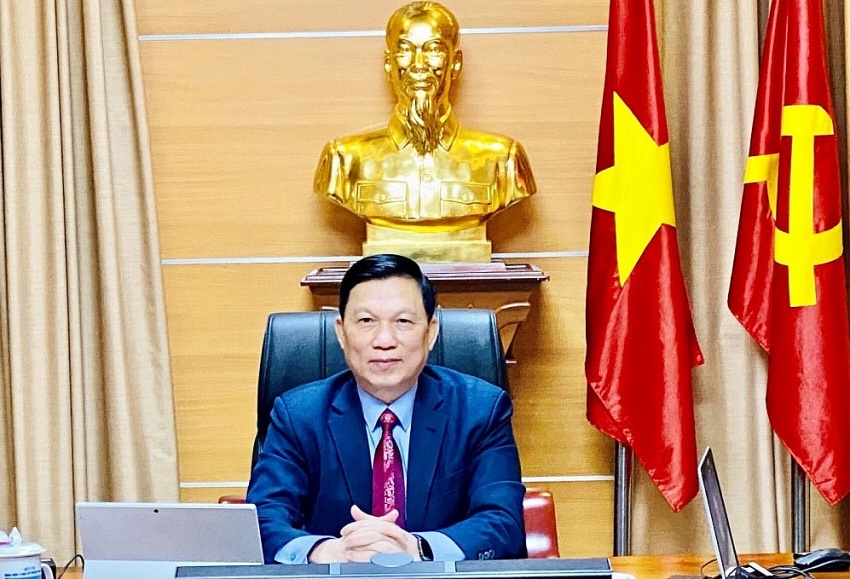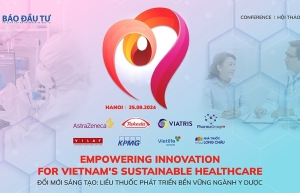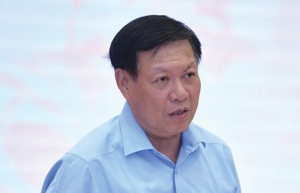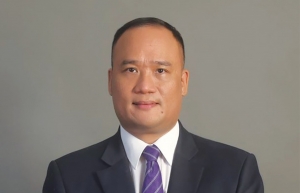Laying a digital path for innovation in healthcare
Over the past decade, the Ministry of Health (MoH) has issued documents of practical significance, with breakthroughs in the application of IT and EMR implementation. These cover medical activities in the network environment, criteria for applying IT at exam and treatment facilities, regulating electronic prescriptions, and more.
 |
| Assoc. Prof. Dr. Tran Quy Tuong, chairman Vietnam Medical Informatics Association |
Currently, in Vietnam, according to the provisions of the Law on Medical Examination and Treatment, the Law on Electronic Transactions, and the aforementioned related legal documents, there is sufficient legal basis for implementing EMR and EMR has the same legal value as paper medical records.
IT infrastructure has been developed. Most exam and treatment facilities have server rooms and dedicated servers. Many treatment facilities have equipped computers for all doctors and staff in need. They have equipped free wireless networks for patients and their families, and 39 per cent of such facilities nationwide have deployed network safety and security systems.
Nearly 100 medical facilities have announced deployment of EMR and have formed a network with many Vietnamese companies and enterprises that research and deploy products on digital transformation of healthcare, with the capacity to provide quality EMR products.
However, some of the main challenges remain in applying EMR in Vietnam. IT infrastructure in the Vietnamese healthcare sector is still in its infancy, while the necessary conditions for applying EMR are already an initial barrier. This has resulted in a large overall cost to deploy the application of EMR and the need to mobilise many resources.
Some hospital directors lack leadership buy-in, do not clearly see the benefits and significance of implementing EMR, and have not proactively implemented EMR at hospitals.
In Vietnam, public healthcare accounts for the majority, and the MoH must have regulations on financial mechanisms so that public hospitals have funds to implement EMR. Currently, there are no specific guidelines on financial sanctions for the application of medical IT in general and the implementation of EMR. Hospitals mainly use the unit’s development investment fund to apply IT, affecting other hospital activities.
Worse still, the IT level of medical staff is still weak or uneven at medical treatment facilities nationwide.
To overcome these challenges, the MoH must synchronously deploy solutions. Specifically, the MoH should strengthen its focus on the work of digital transformation of health in general and the implementation of EMR; the departments and bureaus of the MoH must get more closely involved, advising and proposing to the ministry’s leaders policies to implement digital transformation in healthcare.
In particular, it is necessary to pay special attention to the implementation of platforms, application systems, and specialised databases as a foundation to promote the process of applying EMR. This is a practical solution and a driving force to create readiness for simultaneous implementation.
The MoH should implement sanctions for units and localities that do not implement EMR according to the prescribed roadmap. At the same time, it must pay more attention to promoting successful models. It should promptly encourage and reward localities and units that do well in implementing EMR, thereby helping to spread and create a model of effective study and experience sharing.
The state management agency of health should boost cooperation with professional associations, enterprises, localities, and related experts to create a unified and effective implementation of EMR nationwide; as well as enhance awareness of IT skills of medical staff through seminars and training courses.
In the immediate future, some areas need to be prioritised for digital transformation in the healthcare sector. For example, applications are to be developed to monitor epidemics through collecting data from all sources including people, businesses, medical facilities, social networks, investigation programmes and forecasting outbreaks through big data analysis technology and AI.
Development of smart applications is also necessary to allow the provision of remote monitoring, assistance, and healthcare services, connecting online between patients, health monitoring devices, and medical staff.
For digital transformation in hospitals, software systems must be deployed in compliance with domestic and international standards to ensure the ability to connect, share, and integrate data, while ensuring the ability to connect with all existing equipment in medical exam and treatment facilities on the network to improve automation capabilities.
For digital transformation in administration, the MoH guides and directs local health departments to synchronously deploy specialised information systems and digital databases. Building standards for connecting healthcare-related devices based on the principle of the Internet of Medical Things will also be a foundation for building expert systems to support clinical decision-making.
Finally, it is required to develop AI applications such as a clinical decision support system that is closely integrated and implemented in real-time with electronic health records; apply AI in specialised fields such as diagnostic imaging, cardiovascular, respiratory, and more; build large data systems with fast analysis algorithms to support clinical decision-making; and apply AI in vital areas such as traditional medicine.
 | Empowering innovation for Vietnam's sustainable healthcare VIR plans to host a healthcare conference on September 25, expecting to attract about 200 participants, including policymakers, international organisations, senior experts, and those from the business community. |
 | Takeda’s decade of healthcare commitments in Vietnam For over 10 years, Takeda has been a dedicated healthcare partner in Vietnam, delivering transformative treatments and contributing significant value to public health. The recent approval of its dengue vaccine further strengthens this commitment. Dion Warren, Takeda’s area head for India and Southeast Asia, talked to VIR’s Bich Thuy about the company’s journey and its plans to bring more innovative medicines to Vietnam. |
 | GSK: from treatment to prevention for healthy ageing Dr. Pham Thi My Lien, president of GSK Vietnam, spoke with VIR’s Bich Thuy about the importance of adult vaccinations, one of the most effective interventions contributing to improved quality of life, reducing the burden on healthcare, the economy, and society. |
 | Unlocking the potential of healthcare innovations While health innovation in Vietnam is taking place strongly, many challenges prevent the sector from unlocking its full potential. Do Xuan Tuyen, Deputy Minister of Health, talked to VIR’s Minh Tung about global lessons to improve the situation. |
 | Foreign-led groups seize the initiative in healthcare Vietnam’s healthcare sector is rapidly developing as the country seeks to modernise its system and improve health outcomes for its population. Contributing to this transformation are foreign-invested enterprises (FIEs), which have become key players in driving healthcare innovation across fields such as pharmaceuticals, medical devices, biotechnology, and digital healthcare solutions. |
What the stars mean:
★ Poor ★ ★ Promising ★★★ Good ★★★★ Very good ★★★★★ Exceptional
Related Contents
Latest News
More News
- Masan Consumer names new deputy CEO to drive foods and beverages growth (February 23, 2026 | 20:52)
- Myriad risks ahead, but ones Vietnam can confront (February 20, 2026 | 15:02)
- Vietnam making the leap into AI and semiconductors (February 20, 2026 | 09:37)
- Funding must be activated for semiconductor success (February 20, 2026 | 09:20)
- Resilience as new benchmark for smarter infrastructure (February 19, 2026 | 20:35)
- A golden time to shine within ASEAN (February 19, 2026 | 20:22)
- Vietnam’s pivotal year for advancing sustainability (February 19, 2026 | 08:44)
- Strengthening the core role of industry and trade (February 19, 2026 | 08:35)
- Future orientations for healthcare improvements (February 19, 2026 | 08:29)
- Infrastructure orientations suitable for a new chapter (February 19, 2026 | 08:15)

 Tag:
Tag:

















 Mobile Version
Mobile Version